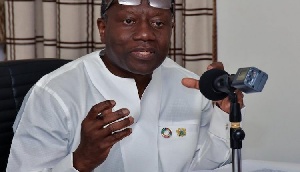 Finance Minister, Ken Ofori Atta
Finance Minister, Ken Ofori Atta
Government needs to fortify its domestic revenue mobilization if it is to effectively implement a cap on budget deficit, an economist with Data Bank, Courage Martey has said.
Vice President, Dr. Mahamudu Bawumia, last year hinted government’s desire to place a cap on Ghana’s fiscal deficit.
It followed Cabinet’s approval for the submission of the appropriate legislation to Parliament to amend the relevant law.
The proposed amendment to the Public Financial Management Act is expected to limit the fiscal deficit to between 3% and 5% of GDP from 2018 to ensure greater fiscal discipline.
Fiscal deficit is the difference between the government’s expenditures and its revenues, excluding the money it borrowed. A country’s fiscal deficit is usually communicated as a percentage of its GDP.
Already government, through the 2017 budget, has put a cap of 25% on its budgetary allocation to statutory funds.
Ghana’s budget deficit has been increasing steadily over the last few years.
Speaking to Starr Business, Mr. Martey noted if the policy comes into force, it will positively affect other aspects of the general economy
He said: “In 2012 for instance, the deficit was higher from 4.7% to 11.5%. In 2016 also the deficit the year before 2016 the debt was 6.3% of GDP but election year it goes higher to 9.3%. now, if you look at the historical dynamics of our GDP, anything above 5% of GDP, any deficit above 5% of GDP tends to come along with it macro-economic instability.
“In other words high inflation, high cedi depreciation and loss of investor confidence. So if you can make sure that the government’s spending above its revenue is contained under 5% of GDP then you can help to sustain macroeconomic stability which is the necessary condition for sustainable growth.”